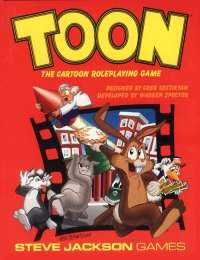Toon (role-playing game)
Toon is a role-playing game in which the players take the roles of cartoon characters.[1][2] It is subtitled The Cartoon Roleplaying Game.[3] Toon was designed by Greg Costikyan and developed by Warren Spector, and first published in 1984 by Steve Jackson Games.[2][3]
 | |
| Designer(s) | Greg Costikyan, Warren Spector |
|---|---|
| Publisher(s) | Steve Jackson Games |
| Publication date | 1984 |
| Genre(s) | Comedy |
| System(s) | Custom |
Development
Jeff Dee came up with the idea of creating a role-playing game based on cartoons when he, Greg Costikyan, and several other designers were talking about genres for which game systems had not yet been designed; although they agreed that such a game would be impossible to design, a few years later Costikyan designed Toon as a full game with the assistance of Warren Spector.[4]
Style
Although Toon is a genuine role-playing game requiring the participation of players and a game master (called the "Animator"), it is designed with a tongue-in-cheek style that deliberately parodies many of the conventions of more standard, "serious" role-playing games.
In Toon the player characters never die.[1] As in many role-playing games, characters have hit points, which are deducted when the character is injured (usually in combat, or by having anvils fall on them). When characters are reduced to zero hit points they do not die or fall unconscious, but fall down. Since cartoon characters never actually die, and always return in time for the next scene, a fallen down character returns to play a set time later, with all hit points restored.
This lack of true "character death" is also designed to encourage players to deliberately abandon the skills and reflexes they learned in other games, namely to have their characters able to solve problems and fight enemies while staying alive.[5] According to the game's rules, the two prime directives for Toon players to follow are "Forget Everything You Know" and "Act Before You Think".[1]
The game encourages players to have fun above all other considerations - even to the point of breaking the rules of the game. If the players and the Animator agree that a players' actions in a game are funny and enjoyable, then that players' actions are allowed and encouraged. This can be seen as a way for players to "break the fourth wall" in the game, in the same way that animated cartoons often ignore reality for the sake of laughs.
The game uses a very simple skill-based task resolution system based on a list of only 23 skills that cover all possible character actions. These are assigned to four controlling attributes, humorously named "Muscle" (strength), "Zip" (dexterity and speed), "Smarts" (intelligence) and "Chutzpah" (pushiness and self-confidence).[3] In addition, characters can have optional "Shticks", which give them unusual cartoon-like abilities, such as flying or invisibility.
The game was inspired by the classic Warner Bros. cartoons of the 1930s through the 1960s, and characters such as Bugs Bunny and Daffy Duck, but Steve Jackson Games is careful to avoid any copyright violations. For example, there is an "Ace Corporation" in Toon products (instead of the Acme Corporation), and the writers' guidelines for Toon prohibit the use of the word "toon" to mean "a cartoon character".[6]
Toon books
- Toon: The Cartoon Roleplaying Game - 1984, out of print.
- Toon Silly Stuff - 1985, out of print.
- Son of Toon - 1985, out of print.
- Toon Strikes Again - 1985, out of print.
- Toon: The Cartoon Roleplaying Game (Deluxe Edition) - 1991. Incorporates all material from the original edition, plus Toon Silly Stuff, Son of Toon, and Toon Strikes Again.
- Tooniversal Tour Guide - 1992.[7]
- Toon Tales - 1993.
- Toon Ace Catalog - 1994.
- Toon Munchkin - 2006.
Reception
Mike Lewis reviewed Toon for Imagine magazine, and stated that "Toon is a very refreshing change from the usual run-of-the-mill rpgs which have been appearing recently. The game very firmly puts a sense of humour back into rpgs. If you are interested in cartoons, then Toon is an essential purchase - but even if you aren't, try it for a change. I am very impressed with the ideas behind this game and hope that it gets more support than most minority RPGs have done in the past. It deserves it."[8]
R.A. Greer reviewed Toon in Space Gamer No. 72.[9] Greer commented that "Toon is a quick cure for all your roleplaying ills, a fast-acting balm to be applied directly to your funny bone, speeding you back to those uncomplicated days of roleplaying when it was fun!"[9]
Stephen Kyle reviewed Toon for White Dwarf #63, giving it an overall rating of 9 out of 10, and stated that "all of us have favourite cartoons or characters and Toon enables you to recreate them easily and with a lot of fun."[10]
Reviews
- Dragon #92
- Dragon #144
- Different Worlds #38 (Jan./Feb., 1985)
- Shadis #28 (1996)
- Casus Belli #23 (Dec 1984)
See also
References
- Carlson, Matt (May 2005). "Unplugged #23: A Parental Guide to Role-playing Games III". GamerDad . Archived from the original on 2008-01-23. Retrieved 2007-10-09. External link in
|publisher=(help) - Cook, Dave "Zeb" (2007). "Toon". In Lowder, James (ed.). Hobby Games: The 100 Best. Green Ronin Publishing. pp. 327–330. ISBN 978-1-932442-96-0.
- de Oude, Jake (March 2002). "Toon (Playtest Review)". RPGnet. Retrieved 2007-10-09.
- Shannon Appelcline (2011). Designers & Dragons. Mongoose Publishing. p. 104. ISBN 978-1-907702-58-7.
- Staplehust, Graham (March 1985). "Open Box: Dungeon Modules". White Dwarf (review). Games Workshop (63): 12. ISSN 0265-8712.
- Writing For Toon
- Waters, Evan (June 2000). "Tooniversal Tour Guide (Review)". RPGnet. Retrieved 2007-10-09.
- Lewis, Mike (December 1984). "Notices". Imagine (review). TSR Hobbies (UK), Ltd. (21): 19.
- Greer, R.A. (Jan–Feb 1985). "Featured Review: Toon". Space Gamer. Steve Jackson Games (72): 10–11.
- Kyle, Stephen (March 1985). "Open Box". White Dwarf. Games Workshop (Issue 63): 11–12.